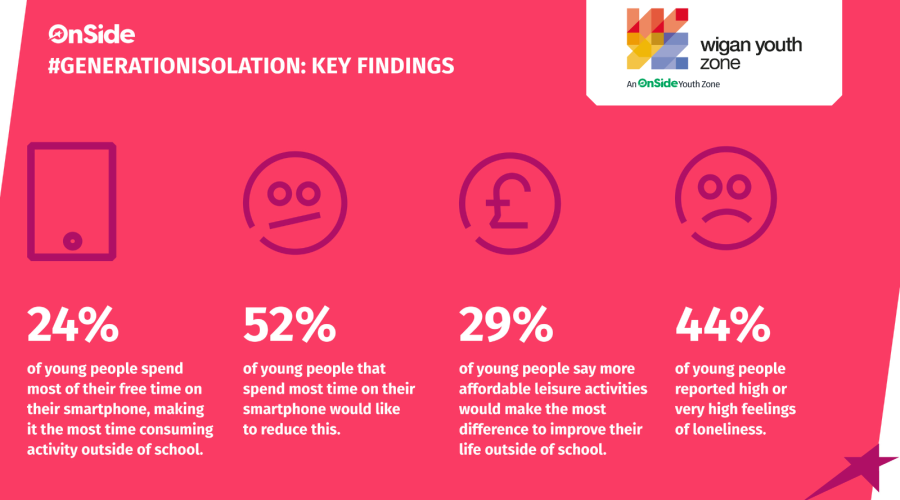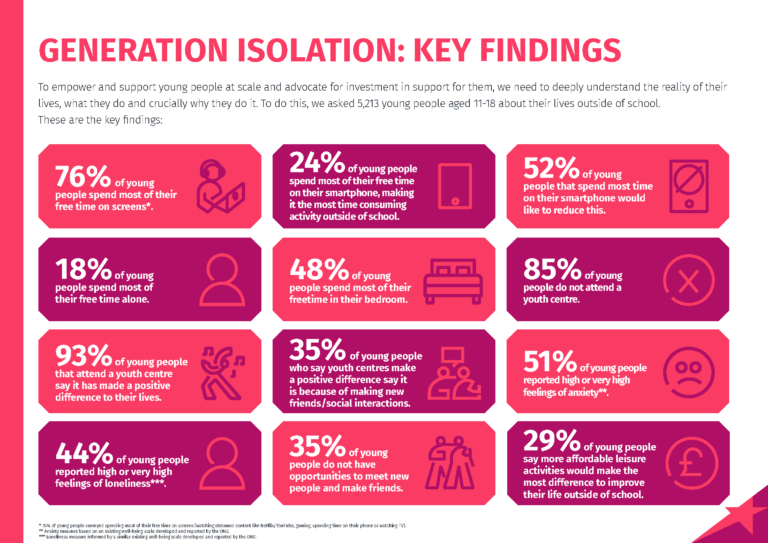Youth charity OnSide’s Generation Isolation, the largest study of its type into the way 11–18-year-olds spend their free time, today reveals that young people want to reduce the amount of time they spend on their phones – but simply don’t know how to break the habit.

● Five OnSide Youth Zones in Greater Manchester – together supporting 14,988 of young people – are today calling for better real-life alternatives to smartphones
● New research released today from youth charity OnSide reveals 24% of 11-18 year olds in the North West spend most of their free time on their smartphone
● 46% of the North West’s young people would like to break the habit but 41% don’t know how
● Young people in the North West feel lonely and anxious – 44% have high or very high feelings of loneliness while 50% have high or very high feelings of anxiety
● Young people in the North West are crying out for real-life social experiences in their community – 29% say more affordable leisure activities like youth centres would do the most to improve their life outside school, while 25% want safe, fun social places to hang out with friends.
Smartphone Use Among Young People
National youth charity OnSide’s Generation Isolation report, the largest study of its type into the way 11–18-year-olds spend their free time, today reveals that young people want to reduce the amount of time they spend on their phones – but simply don’t know how to break the habit.
Key Findings
The new report, based on a survey of 5,213 11-18 year olds in England in partnership with YouGov shows that smartphone use is one of the most dominant free time activities for young people in the North West, with 24% spending most of their free time when not in school on their phone.
The five Youth Zones in Greater Manchester – BLGC in Bolton, Wigan Youth Zone, Mahdlo in Oldham, HideOut in Gorton and Manchester Youth Zone in Harpurhey – are part of the national OnSide network of 15 Youth Zones, and provide vital youth worker support and activities for 14,988 young people in Greater Manchester.

Youth Zones’ Response to Findings
Today the CEOs of five Youth Zones reacted to the report’s findings by calling for better, real-life alternatives to smartphone dependency. Specifically, for every young person to have access to high-quality youth centres and dedicated youth workers to help them build rich, real life social connections and experiences that are more compelling than the lure of a smartphone.
Smartphone Usage Statistics
Generation Isolation, now in its third year, finds smartphone use is now the most dominant free time activity for 11–18-year-olds in England with 1.3 million* (24%) spending most of their free time on their smartphone. Of those who spend the most time on their devices, the study reveals that across England over half (52%) would like to reduce their screen time, yet 46% don’t know how to break the habit. In the North West this is lower with 24% of young people spending most of their time outside school on their phone, 46% of these would like to reduce their screen time, however 41% do not know how to.
Reasons Behind Smartphone Use
When asked about why they spend time on their smartphone, 47% of young people in the North West said they are worried about feeling left out from friends if they don’t use their device; 25% said they have more friends to talk to on their smartphone than they do in real life and 10% said being on their phone is better than real-life.
LOneliness and Anxiety among youth
Worryingly, asked for the first time about levels of loneliness, 44% of young people in the North West said they’d experienced high or very high levels of loneliness.
Feelings of loneliness almost match sustained anxiety in this age group as 50% of those polled in the North West stated they’ve experienced high or very high levels of anxiety.
Calls for Real-Life Social Experiences
Young people in the North West are clear about what is needed. Asked what one thing would improve their lives outside 29% opted for more affordable leisure activities, 25% wanted more safe and fun places to socialise and 16% want more opportunities to learn skills outside of school.
Importance of Youth Clubs
Generation Isolation has been released to coincide with National Youth Work Week, an initiative to raise awareness of youth work and youth workers.
The report shows that the solution to many of the problems young people face today lies in youth clubs, which play a vital role in enabling them to build face-to-face connections and develop skills and resilience.
Positive Impact of YOuth CLubs
The vast majority 94% of young people who attend a youth club in the North West say it has made a positive difference to their lives with ‘making friends and social interaction’ being the most popular reason for this, and 92% say their youth club has helped them to develop new skills.

“As concerns grow about the impact of smartphone overuse on young people, we're committed to providing meaningful face-to-face interaction through engaging activities that allow our members to connect in real time. For our junior members, we’ve taken it a step further by creating phone-free sessions, ensuring they can fully engage in hands-on experiences without digital distractions. It’s part of our effort to encourage healthy social connections and help young people develop the confidence and skills they need both online and offline.”
- Sikander Ali, Head of Operations
Onside Chief Executive, Jamie Masraff, said:
“The message from young people is overwhelmingly clear - they want to ditch smartphone dependency and socialise in person, but feel trapped in a habit that is leaving them lonely, isolated and anxious. We are letting young people down by treating time outside of school as an afterthought and not creating enough opportunities in real life that are better than life on screens. “Without the provision of affordable, safe places to flourish outside of school, we risk a generation becoming adults who struggle to exist in a real-word environment, riddled with social anxiety and lacking in social skills. “Evidence shows that youth clubs offer rich and vibrant environments where young people, supported by dedicated youth workers, have fun, build confidence, develop life skills and become happy, healthy, thriving adults. Youth provision is the untapped solution to the challenges outlined in Generation Isolation. – it must become a right and reality for all young people.”
Access to Full Report
To read the full Generation Isolation report visit: www.onsideyouthzones.org/generationisolation.
About Generation Isolation
Generation Isolation, England’s largest study of its kind into how young people aged 11 to 18 years, launched in 2022 and is now in its third year. This year’s survey of 5,213 11 to 18 year olds in England was carried out online by YouGov between 23 August and 6 September 2024. The figures have been weighted and are representative of all 11 to 18 year olds in England.
About THe OnSIDE NETWORK
OnSide is a national charity that believes all young people should have the opportunity to discover their passion and their purpose. To achieve this, it funds and builds state-of-the-art, multi-million-pound youth centres called Youth Zones in the country’s most economically disadvantaged areas backed by a growing movement of local authorities, philanthropists and business backers.
Youth Zones are brand new, purpose-built spaces fizzing with energy and crammed with incredible facilities. They offer more than 20 activities each night ranging from football, climbing walls and cooking to skating, DJ-ing, drama and employability training with entry costing just 50p along with a £5 membership.
Youth Zones are staffed by skilled and dedicated youth workers who truly believe in young people – helping them see what they could achieve, and giving them the skills, confidence and ambition to go for it. Over 55,000 young people are already members across the growing OnSide Network of 15 Youth Zones. The charity is developing a further 7 Youth Zones in different parts of the country that will see its reach double over the next 3 years.
Each Youth Zone is an independent charity with its own private sector-led board. This model of local ownership is a key factor in ensuring the financial sustainability of each Youth Zone.
Visit www.onsideyouthzones.org for more details.





 Hannah has a passion for youth work and creating safe spaces for young people to express
Hannah has a passion for youth work and creating safe spaces for young people to express 

















































